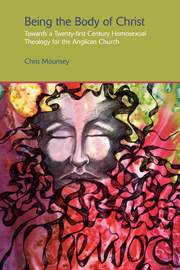Book contents
- Frontmatter
- Contents
- Introduction: Homosexuality and Anglicanism
- PART I
- PART II
- 6 Edward Carpenter: Towards Democracy – The Greatest Poet England Never Had
- 7 Alan Hollinghurst: The Swimming-Pool Library – The Belle Époque of a Prodigal
- 8 Jeanette Winterson: Lighthousekeeping and The PowerBook – The Theology of the Body
- Conclusion: Blindness and Insight – Some Reflections
- Select Bibliography
- Subject Index
- Author Index
8 - Jeanette Winterson: Lighthousekeeping and The PowerBook – The Theology of the Body
from PART II
- Frontmatter
- Contents
- Introduction: Homosexuality and Anglicanism
- PART I
- PART II
- 6 Edward Carpenter: Towards Democracy – The Greatest Poet England Never Had
- 7 Alan Hollinghurst: The Swimming-Pool Library – The Belle Époque of a Prodigal
- 8 Jeanette Winterson: Lighthousekeeping and The PowerBook – The Theology of the Body
- Conclusion: Blindness and Insight – Some Reflections
- Select Bibliography
- Subject Index
- Author Index
Summary
It is not difficult to argue that Jeanette Winterson's early writing continues to express her early life experience in Christianity. In Art Objects, her non-fiction work about aesthetics, she tells us that Sexing the Cherry is a reading of T.S. Eliot's Four Quartets. Eliot's complex religious poems resound throughout Winterson's oeuvre in quotation and cadence. But on the other hand, one might reply to such a position that Winterson was consciously or unconsciously quoting favourite poetry in the same way she might be using the language of her own religious upbringing.
Caroline Gonda suggested to me that Jeanette Winterson's writing has always been marked by her childhood as a preacher. I believe she was suggesting that if I thought that I found an interest in the spiritual in it, it was not necessarily intentional, but a rhetorical strategy that was ‘hard wired’ into Winterson's psyche, and as such could not help but appear in her writing.
I lived with a Unitarian Minister for seventeen years, and Saturday nights were always times of dread, with ‘Sermon-itis’ as my normal weekend stricture, and I am the inheritor of a thousand arguments about what to preach. As a ‘hard-wired’ Anglican myself, I could not understand my partner's need to find something new to say each week. The cycle of texts from the Bible set for the Anglican calendar, I argued, cannot ever produce a cycle of identical sermons.
- Type
- Chapter
- Information
- Being the Body of ChristTowards a Twentieth-Century Homosexual Theology for the Anglican Church, pp. 198 - 215Publisher: Acumen PublishingPrint publication year: 2012



